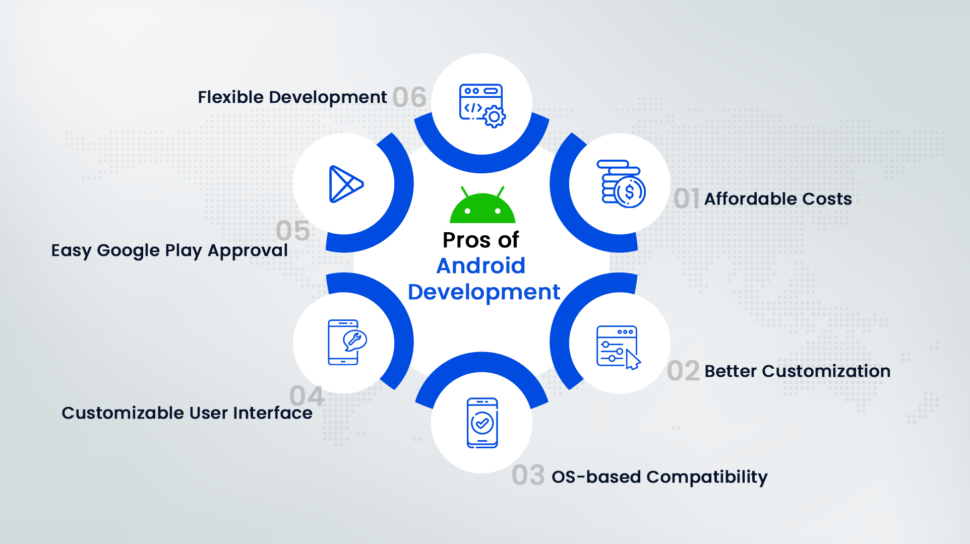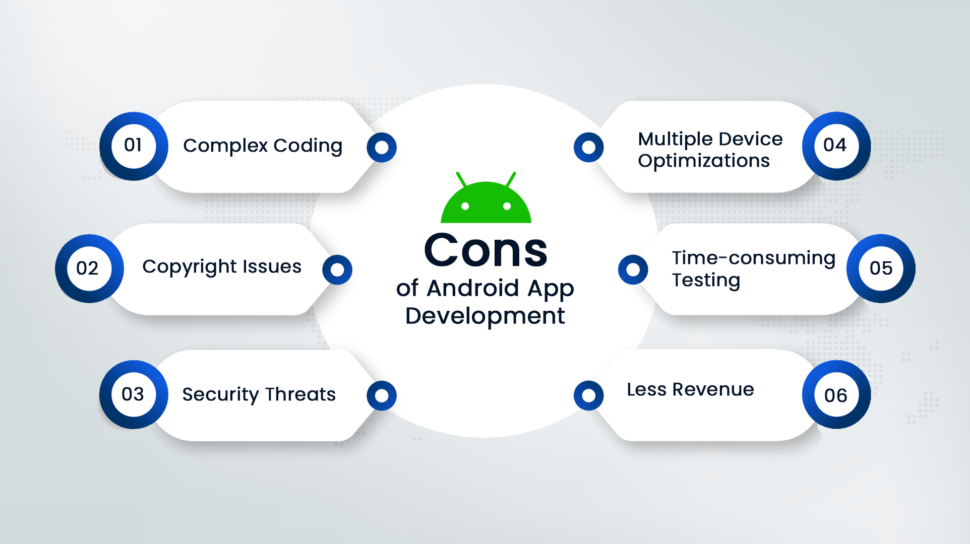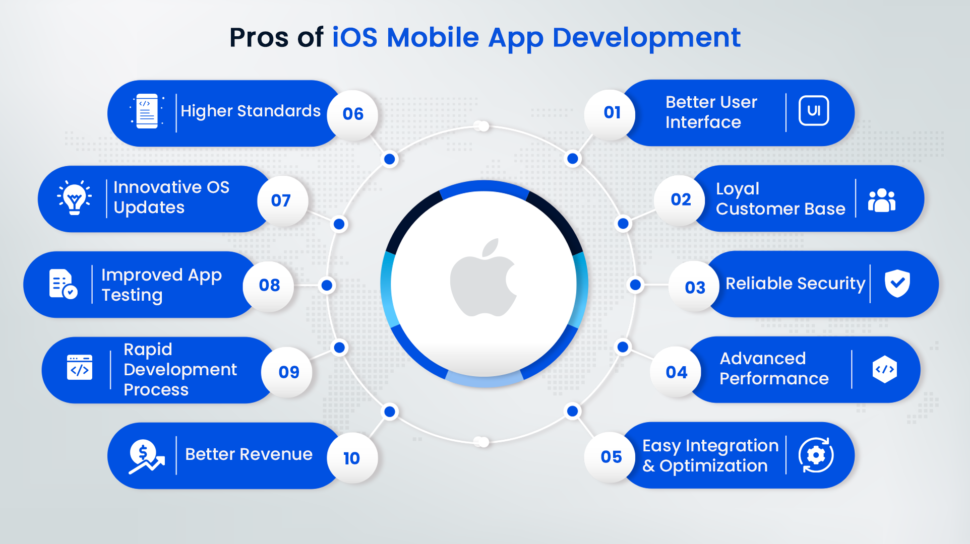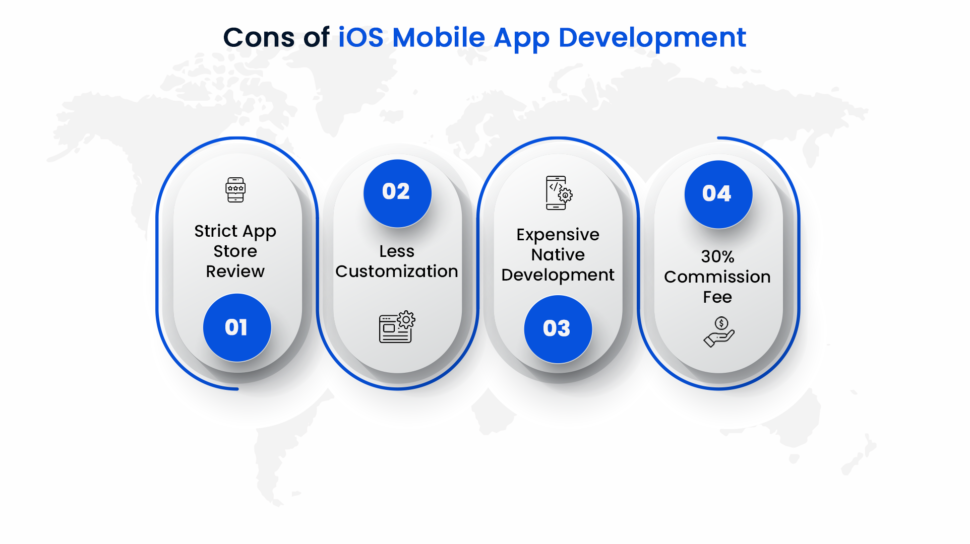The dilemma between choosing iOS vs. Android development is still as complex as businesses thought it to be years ago. Simply put, iOS is the best option if you want your app to have better security, loyal users, and chances of increasing revenue. It is because the Apple app store’s worldwide revenue reached $21.2 billion in the third of 2022 (Google Play only $10.4 billion). iOS development gives you access to such a lucrative platform.
On the other hand, Android is an ideal option when your primary goal is to ensure more downloads and a large user base for your app 70.96% of the global mobile operating system market share belongs to Android. On top of that, the number of (Android) app downloads on Google Play reached 27 billion in 2022, significantly higher than the Apple app store (iOS) with only 8.2 billion app downloads.
Now that you know the main courses, you can learn about a few appetizers that provide interesting and valuable industry insights about Android and iOS development, making it easier to decide between them for your business.
Pros of Android Development
Android development is highly advantageous for startups wanting to introduce their business in the app industry.

Pros of Android Development
- Affordable Costs
- OS-based Compatibility
- Better Customization
- Customizable User Interface
- Easy Google Play Approval
- Flexible Development
Affordable Costs
Once you pay the one-time $25 fee for a developer account on Google Play, you use multiple Android SDKs to create and experiment with innovative approaches toward app development at lower costs. Such development solutions can ensure increased ROI without high development costs.
OS-based Compatibility
Android applications are compatible with multiple Android devices and provide a good user experience on all of them. Such compatibility is possible because Android has widespread integration capability, making Android apps always within reach of users on more than one type of digital device. Such accessibility to an application can make Android development the best option, especially for creating healthcare or fintech applications.
Better Customization
Choosing Android development allows you to improve the performance, user interface and experience, and overall application functionality by integrating it with the data management and multimedia tools of your business. In short, Android apps are easy to customize as they include ROMs that enable the building and customization of an application according to your business requirements and goals.
Customizable User Interface
A user-friendly interface looks appealing, loads faster, and simplifies every process in the application for target users. However, a better user interface lets users customize the operations, appearance, and accessibility of the app according to their preferences. Android development can allow you to create such an application due to its numerous customization and personalization tools.
Easy Google Play Approval
Unlike the Apple app store, which has a long and strict app review process, Google Play has a much easier one, rejecting only applications that violate many of its primary content policies. Therefore, spending money and time on Android app development increases your chances of getting it published and deployed. You may not always be able to make that happen with an iOS app, wasting your time, money, and other company resources.
Flexible Development
Android is an open-source platform that provides opportunities for developers to use multiple frameworks, SDKs, and plugins to experiment with both the functional and non-functional elements of the development and build a uniquely innovative app without stretching your budget too much. Such OS flexibility makes it easy for a business to build an app with functionality and appearances unique to their product/services and brand image.
Cons of Android App Development
Besides the lack of better security solutions and guidelines, Android app development has many other disadvantages that you must consider.

Cons of Android App Development
- Multiple Device Optimizations
- Time-consuming Testing
- Less Revenue
- Security Threats
- Copyright Issues
- Complex Coding
Multiple Device Optimizations
There are many Android devices with different screen sizes, sensors, and functionalities, which forces developers to optimize the UI and functionality of the app for every Android device. It is important to note that any errors and design issues can create a bad user experience and make your Android app look less appealing to users. Optimizing an app for multiple devices while increasing the development time and Android app development cost has a lasting impact on the app’s quality in terms of design, functionality, and user experience.
Time-consuming Testing
Since an Android app has to be accessible on multiple devices with different screen sizes, sensors, and functionality requirements, the testing for such an app takes a lot of time and multiple strategic testing protocols to ensure the app meets expectations.
Less Revenue
Unlike iOS device users, Android users are generally not open to spending money on in-app purchases or paying for application accessibility. That is why generating good revenue with an Android app is not possible unless you have something unique to offer (like Amazon and Netflix).
Security Threats
Although being an open-source platform has its advantages, Android has a lot of security issues and incidents because of it, especially when compared to iOS. It faces fewer to no security issues due to its closed ecosystem.
An Android app is always vulnerable to security threats like user data theft, man-in-the-middle (MITM) attacks, malware, and data leaks. It can lead to customer defections and give your brand an untrustworthy reputation.
Copyright Issues
Google Play app approval may be easy and take less time, but it does not primarily focus on patent/copyright elements when reviewing an app. It can leave your app vulnerable to copyright infringement claims if another app includes the same content, user interface, theme, or icon.
You will have to conduct thorough research on apps similar to yours to ensure similarities that could lead to copyright infringement are removed from your app, saving time and money and preventing further delays in app deployment.
Complex Coding
Most developers use Java and Kotlin (primary programming languages of Android) for Android app development. Unfortunately, they are both highly complicated, and coding with them takes a lot of time and advanced skills/experience compared to Swift and Objective-C.
Pros of iOS Mobile App Development
iOS app development has financially beneficial outcomes that business owners must not overlook when choosing between iOS apps and Android apps.

Pros of iOS Mobile App Development
- Better User Interface
- Loyal Customer Base
- Reliable Security
- Advanced Performance
- Easy Integration and Optimization
- Better Revenue
- Rapid Development Process
- Improved App Testing
- Innovative OS Updates
- Higher Standards
Better User Interface
Apple provides some helpful Dos and Don’ts for UI design that help UI/UX designers create user-friendly and advanced user interfaces. Since user interface and experience are crucial factors that ensure user retention and loyalty, choosing iOS app development puts your app in the direction of success from the beginning.
The user experience of an iOS application is always significantly more appealing and convenient than most Android applications.
Loyal Customer Base
Google Play has about 3.5 million apps available for users, while Apple has nearly 2 million. Although Android has more apps, Apple makes up for the low numbers by providing better quality and a loyal customer base.
Choosing iOS development may not ensure a large user base for your app, but it will ensure a loyal customer base if your application provides value.
Reliable Security
iPhone vs. Android demographics are drawn to apps that can guarantee the security of their personal information and privacy, and iOS app development can help achieve that. Apple platform security provides guidelines for securing an iOS app from many security threats like data theft and leaks, malware, viruses, or any security vulnerabilities that could risk the security of the OS.
Not meeting the security standards of the Apple app store is mandatory to get it approved for publication, thus ensuring that your application has enhanced security for your users and organizational data included in the app. The iOS being a closed ecosystem also adds to better app security.
Advanced Performance
iOS is a closed ecosystem providing advanced tools and solutions in the form of hardware and software to ensure every element in its applications is of top-tier quality, ensuring that you create an app with advanced functionality and performance.
Its strict guidelines for app review make it necessary for developers to build such functionality, UI, and performance in the app.
Easy Integration and Optimization
iOS apps only have a few types of devices (for example, iPhone, iPod Touch, and iPad) that require functionality and system optimization, unlike Android apps that require complex optimization and integration for many devices.
It simplifies the integration and optimization process for your iOS app developers, ensuring that your application is 100% compatible and provides the same performance on devices with the same OS.
Better Revenue
As mentioned above, the Apple app store can generate better revenue (a global revenue of $21.2 billion in 2022). iOS app users are more likely to pay for in-app purchases and subscriptions than Android users, providing a platform where you can build a lucrative app for your business with the right development approach and marketing.
Rapid Development Process
The primary programming languages of iOS- Swift and Objective-C are easier to read, write, and modify, speeding up the coding stage of development and ensuring your app is ready for submission and deployment in time or before.
Improved App Testing
The Apple developer program provides access to a tool like TestFlight, which helps developers test an iOS application according to the standards and guidelines of the Apple app store. It enables you to build an app with fewer/no errors, bugs, or UI/UX issues, increasing its chances of approval.
Innovative OS Updates
Apple releases OS updates from time to time that require apps to optimize their functionality to keep up with the advancements, improving the functionality and UI/UX design of your iOS application.
Higher Standards
The Apple app store has standards for security, design, and performance that every app on its store has to meet in order to get approved and published, ensuring that developers do not overlook any flaw or error in the mobile app.
Cons of iOS Mobile App Development
Like Android, iOS does have its cons that may prove highly disadvantageous for some businesses.

Cons of iOS Mobile App Development
- Strict App Store Review
- Less Customization
- Expensive Native Development
- 30% Commission Fee
Strict App Store Review
The Apple app store has a strict app store review process that ensures that applications of low quality, bad UI/UX design, and poor functionality/performance do not get published on its app store.
Additionally, the Apple app store will most likely reject your app if your application includes products and services that provide no real value to target users. It can waste time, money, and effort you and your team put into the development process.
Less Customization
As mentioned above, the app store guidelines require developers to meet quality standards, adding limitations to customizations developers can make in the app. Ensuring your app can stand out in the app store becomes nearly impossible due to that.
Expensive Native Development
Native iOS development can prove expensive as you have to build an app with a focused iOS-driven approach, which requires you to meet all the requirements and guidelines of the Apple app store and continue doing so if your app gets rejected after review.
30% Commission Fee
Apple app store takes a 30% commission for every transaction made on the app store for in-app purchases and subscriptions. The percentage for subscriptions drops to 15% after a subscriber completes one year. Either way, a small business or startup cannot afford such a commission rate on the app store.
Comparison Between iOS and Android Applications
A valuable difference between Android and iOS is that Android development provides your business with a platform where your products/services and marketing/ad strategies can reach a large audience.
IOS development provides your business with a quality-driven approach that has better potential to generate lasting revenue for your business, gain a loyal customer base, and ensure a reliable platform for your users with enhanced security.
iOS vs. Android Development Comparison
| Application | iOS | Android |
| Return on Investment (ROI) | High | Average or Low |
| Development Cost | High or Affordable | Affordable |
| Customization | Low | High |
| User Interface | Advanced and Appealing | Average, Bad, or Advanced |
| User Experience | Highly Convenient | Poor or Average |
| App Review Process | Strict and Mandatory | Easy |
| Quality Standards | Extremely High | Average |
| Flexibility | Less | High |
| Native Development Cost | Expensive | Standard and Affordable |
| Commission Fee | 30% or 15% | 15% or 30% |
| Development Speed | Fast | Slow or Average |
| App Testing | Easy and Effective | Complicated and Time-consuming |
| Security | Highly Advanced and Reliable | Not Reliable |
| Performance | Advanced | Average or Advanced |
Conclusion
Choosing between iOS and Android development depends on your business, project, and budget requirements. If you are in a position where you have to choose between the two, choose iOS as businesses thrive on revenue, and it can provide that faster. Otherwise, choose mobile app development for Android and iOS through a cross-platform approach to conducting business through an app with advanced functionality and a user-friendly interface, making user retention and increasing revenue a little easier for your business.
However, if you have a limited or low budget, go with offshore mobile app development services that provide cross-platform solutions and affordable Android/iOS app development costs for native development. It is a clever choice when growing your business through an application without spending excessive money on development.
Frequently Asked Questions
Android is an open-source platform and an operating system trusted by millions of users worldwide due to its availability at affordable costs, providing access to a large user base compared to iOS. It is better for developers due to its customizable development solutions (SDKs) and easy Google Play app review process.
iOS is a closed ecosystem that provides better application security, a loyal customer base, and a higher return on investment (ROI), qualities valued by and essential for any business wanting to build an app for their business.
Developers prefer iOS development over Android because their work includes hours of coding, and coding with Swift and Objective-C is less complex (easy to write, read, and modify) than coding with Java and Kotlin (not easy to write and read).
In terms of coding, iOS development is less complicated than Android development. But when you focus on quality standards and app review processes, Android development proves easier than iOS.
MVP Android app development takes about 2 to 4 months, standard Android development takes about 6 to 8 months, and advanced app development takes from 8 months, one year, to 1 year & 4/6 months. The development duration depends on your project/business requirements, UI/UX standards, and developers.
iOS app development takes 4 to 6 months for a basic/standard version and 6 to 8 months maximum for an advanced version. Again, the project/business requirements, Apple app store review guidelines/standards, and developers determine the duration of iOS app development.





















.png)
.png)
.png)



Leave a Comment